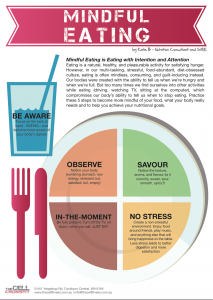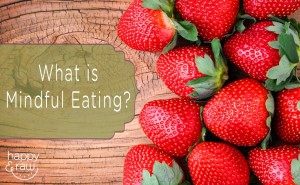What is mindful eating?
You may be familiar with the term ‘mindfulness’, but are you aware this can be applied to our eating habits? Mindful eating uses the act of mindfulness, or being present, to help overcome eating problems in our increasingly busy lives. The goal is to shift focus from external thinking about food to exploring (and enjoying) the eating experience. It is not a diet and is focused around developing a new mindset around food.
Definition of mindful eating: “paying attention to an eating experience with all of our senses (seeing, tasting, hearing, smelling, feeling); witnessing the emotional and physical responses that take place before, during and after the eating experience”
When are you mindlessly eating?
You may be eating mindlessly if you:
- consistently eat until you are overly full or feel sick
- find yourself grazing on food without really tasting it
- don’t pay attention to the foods you are eating and frequently eat surrounded by distractions
- rush through meals
- have trouble remembering the taste, smell and look of the meal you have just eaten.

How to eat mindfully
Practicing a more mindful approach to eating can enhance the enjoyment of your meals, reduce overeating, aid good digestion, reduce anxious thoughts surrounding food, and improve your psychological relationship with food.
Below are my top tips to help you practice mindful eating:
- Give priority to mealtimes – try to take at least 15min to sit down and enjoy your meal.
- Avoid distractions whilst eating (with the exception of dining company). It is impossible to truly enjoy eating (or food) whilst our attention is elsewhere. Ask yourself how often you eat while in the car? While watching TV? Or in front of your computer? Eating in these circumstances is usually mindless and can lead to overeating, choosing unhealthier options or not enjoying your meal at all. Make note (in your mind or on paper) of the times or circumstances where you eat surrounded by distractions. This will make you more aware of those situations and help you to avoid them.
- Avoid being rushed around mealtimes; schedule time to eat your meal when you have adequate time and are unlikely to be interrupted.
- Always sit down for meal. Try to avoid eating standing up or in front of the fridge.
- Serve your food onto a plate/bowl. Try to avoid eating food from the packet, ice cream tub, take away container, etc
- Rest your cutlery next to your plate between mouthfuls and make a conscious effort to chew your food thoroughly.
- Eat only until you are 80% full (meaning you are satisfied but not overly full).
- Take time to truly savour and taste your food. Use your senses! Before eating take note of the look, smell and overall appeal of the meal you are about to eat. During the meal identify components of the food you taste. What is the flavour? What can you smell? How does it feel in your mouth?
- Ask yourself how you feel about the food you are eating. Do you feel happiness, pleasure, regret, guilt, stress, disappointment? Ask yourself what thoughts the food brings to mind. Does it bring up any memories, fears or beliefs? Before and after the meal ask yourself how your body feels. Do you feel energized, lethargic? Does your stomach feel full, nauseous, empty?
- Prepare your own meals where possible. The act of preparing food – touching, tasting and smelling – may improve your psychological relationship with food.
- Take note of the difference good food (fresh, seasonal, minimally processed wholefoods) makes to your mood and overall vitality. Food is there to nourish your body and provide nutrition to facilitate optimal functioning. When you eat better you will feel better both physically and psychologically.

How eating disorder counselling can help
If you are having difficulty practicing mindful eating and you feel you have an unhealthy relationship with food, contact the Psych Professionals. Our Eating Disorder Counselling can help you.

